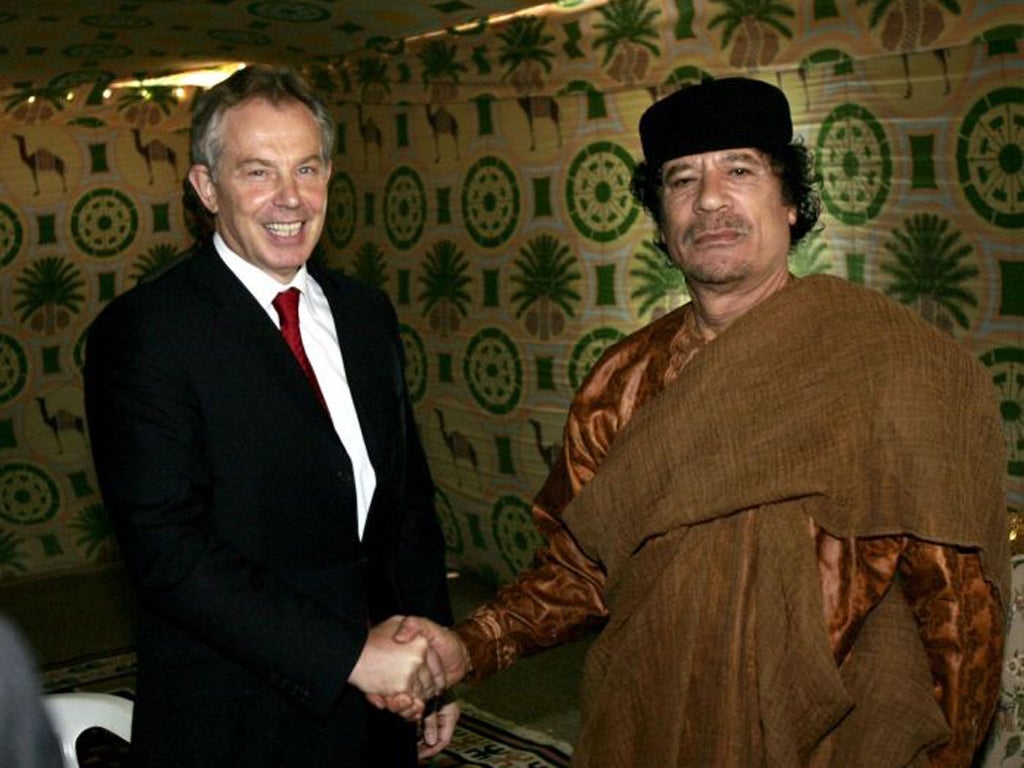Inspectors uncover Gaddafi's secret stash of chemical weapons
Discovery raises questions over former Libyan leader's 'deal in desert' with Tony Blair

Your support helps us to tell the story
From reproductive rights to climate change to Big Tech, The Independent is on the ground when the story is developing. Whether it's investigating the financials of Elon Musk's pro-Trump PAC or producing our latest documentary, 'The A Word', which shines a light on the American women fighting for reproductive rights, we know how important it is to parse out the facts from the messaging.
At such a critical moment in US history, we need reporters on the ground. Your donation allows us to keep sending journalists to speak to both sides of the story.
The Independent is trusted by Americans across the entire political spectrum. And unlike many other quality news outlets, we choose not to lock Americans out of our reporting and analysis with paywalls. We believe quality journalism should be available to everyone, paid for by those who can afford it.
Your support makes all the difference.The former Libyan leader Colonel Muammar Gaddafi had an undeclared stockpile of chemical weapons, inspectors announced yesterday, calling into question the judgement of Tony Blair, who accepted the former dictator's promise to destroy them.
Inspectors from the Organisation for the Prohibition of Chemical Weapons (OPCW) have been in Libya this week, and discovered that in addition to the tonnes of mustard gas components that Gaddafi's regime admitted to holding, it also had a secret stockpile of chemical shells which should have been declared.
Colonel Gaddafi promised to destroy all such weapons when Mr Blair visited the country in 2004 and they reached the now infamous "deal in the desert". In November last year, the former Prime Minister defended his approach to the regime. "He was developing a nuclear and chemical programme," he said. "He gave it all up."
Gaddafi's promise to abide by international law on nuclear and chemical weapons ended Libya's status as a pariah nation, and gave Mr Blair a much-needed diplomatic success after months of searching had failed to turn up any such weaponry in Iraq. Saddam Hussein's failure to comply with a UN resolution ordering him to open his country to weapons inspectors was the official reason for the 2003 invasion.
The Libyan dictator began the process of destroying his arsenal of chemical weapons after 2004, but it was suspended in February last year at the start of the civil war that ended with the overthrow and death of Gaddafi.
During that conflict, rebels feared that Gaddafi's force might attack them with the stockpiled weapons. At that stage, the regime held more than 11 tonnes of components for mustard gas that it had declared to international inspectors.
After Gaddafi's fall, the new government reported to the OPCW in November that they had found what they believed to be a stockpile of illegal weaponry. A team of inspectors arrived in Tripoli on Tuesday.
An OPCW spokesman said: "The two-fold purpose of this inspection was to verify the new declaration in terms of types and quantities of chemical weapons, and to assist Libyan authorities in determining whether another set of discovered materials is declarable under the provisions of the Chemical Weapons Convention.
"The mission was carried out with the logistical support of the Federal Republic of Germany and the UN Department of Safety and Security, and with the full co-operation of Libyan authorities."
Libya was a signatory to an international treaty under which all stockpiles of chemical weapons were to have been destroyed by 29 April 2012. According to the OPCW, the Gaddafi regime had only destroyed about 54 per cent of its declared sulphur mustard and about 40 per cent of the precursor chemical components.
All are now stored at a depot in south-east Libya along with other munitions, mainly artillery shells, which were not declared but which proved on inspection to be for use in chemical warfare. The new government has been given until 29 April to submit a detailed plan for the destruction of the remaining weapons.
Libya is not the only state expected to miss the deadline. The US has acknowledged that it may take until 2021 to finish destroying the final 10 per cent of its chemical weapons. Russia is even further behind in its efforts, having destroyed only about 48 per cent of its cache.
Gaddafi regime spokesman's capture denied
Reports that Moussa Ibrahim, the face of the Gaddafi regime during the Arab Spring, has been captured were denied last night by an official in Tripoli. Ibrahim was said to have been seized in Assabia but there was uncertainty even 50 miles away in the capital over how reliable those claims were. Mistaken reports of him being taken into custody have been made at least three times recently. As official spokesman for the regime, he held frequent news conferences and was seen as one of Gaddafi's most loyal followers.
Kim Sengupta: There were barrels of liquid, protection suits and gas masks
Join our commenting forum
Join thought-provoking conversations, follow other Independent readers and see their replies
Comments